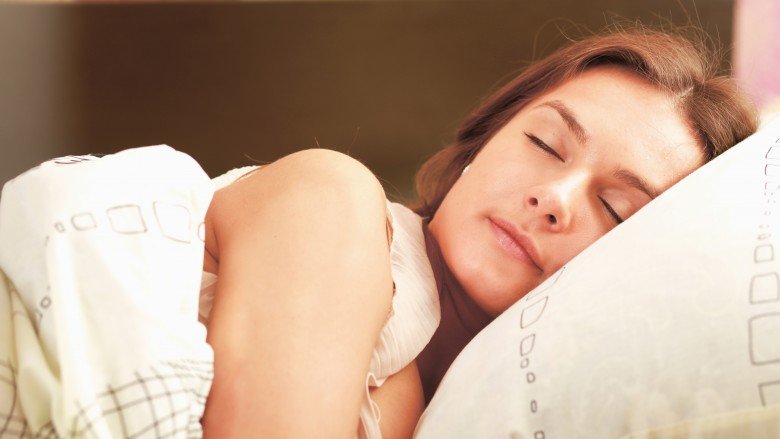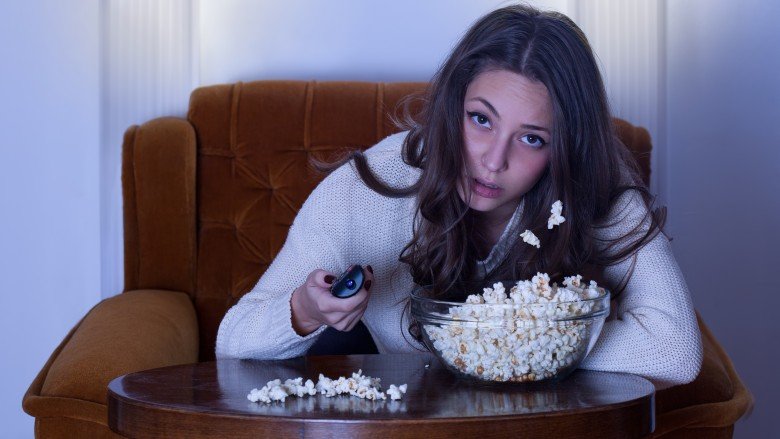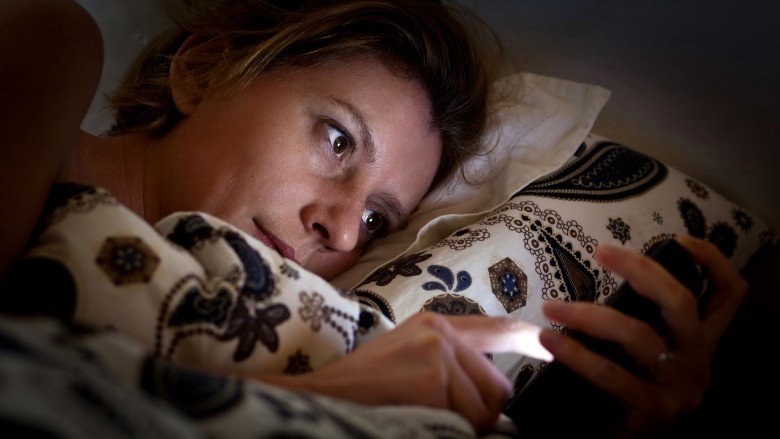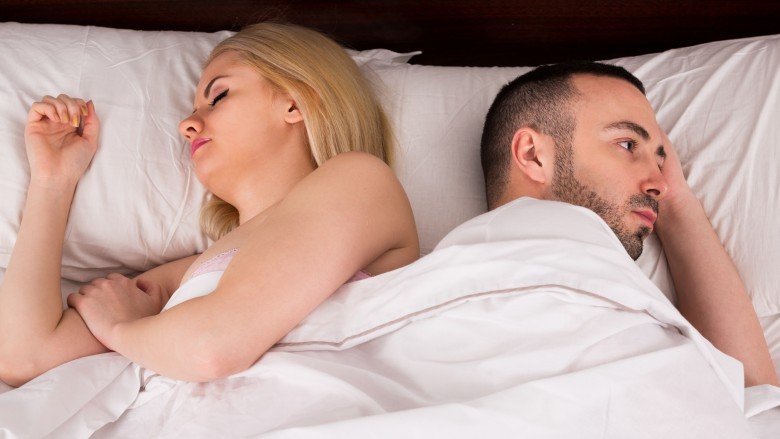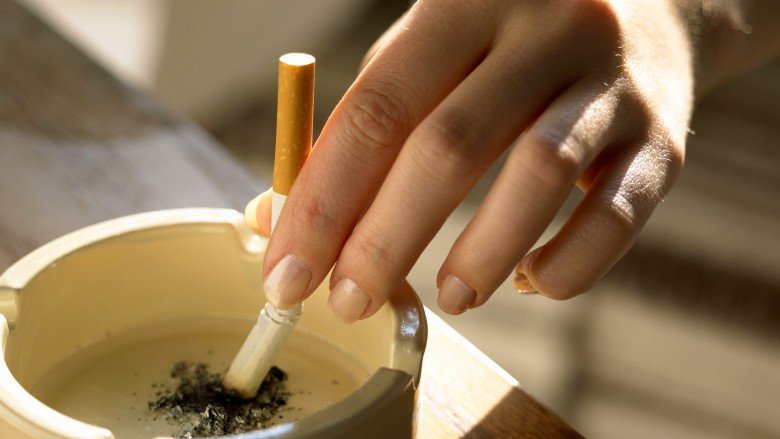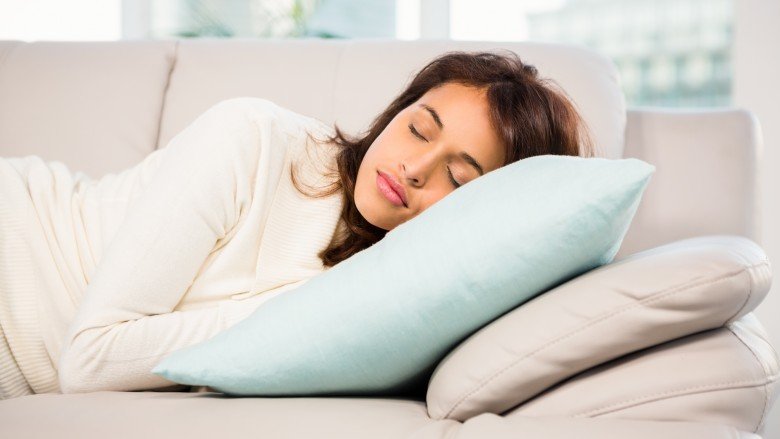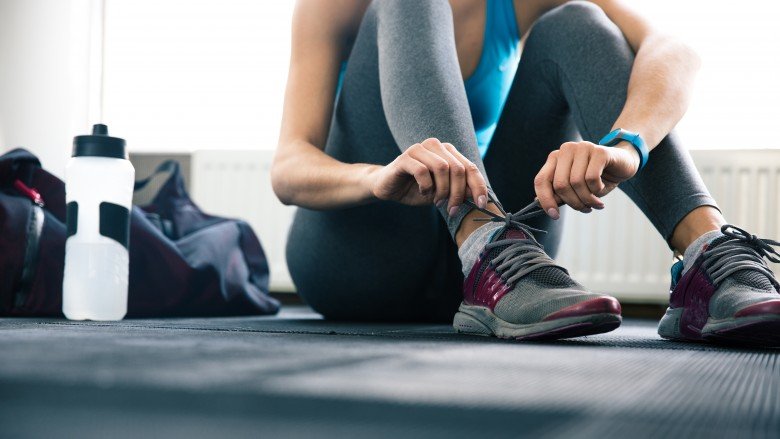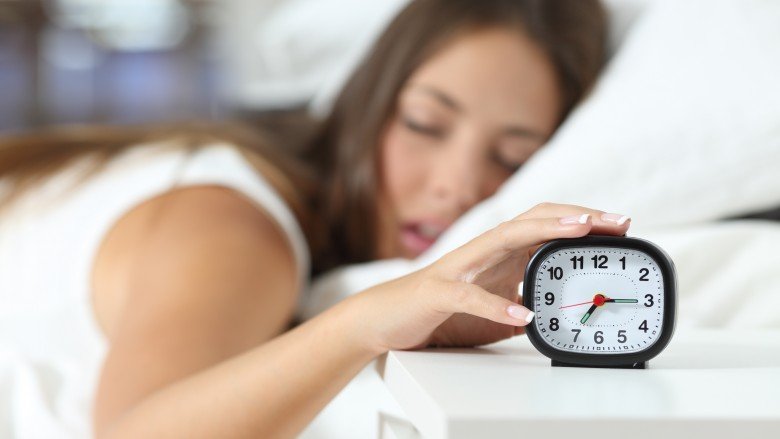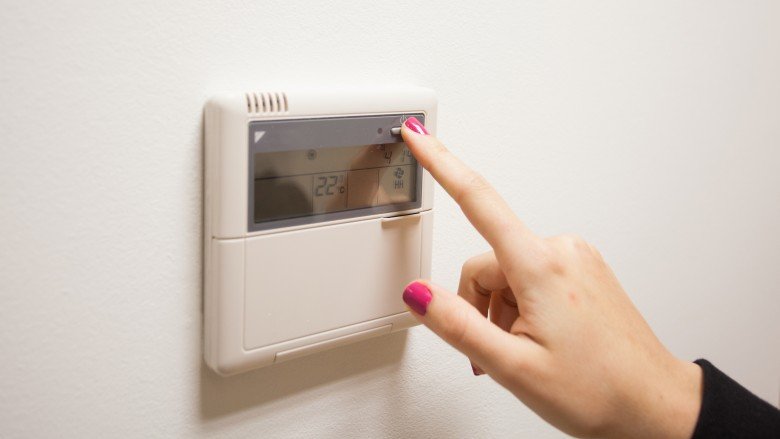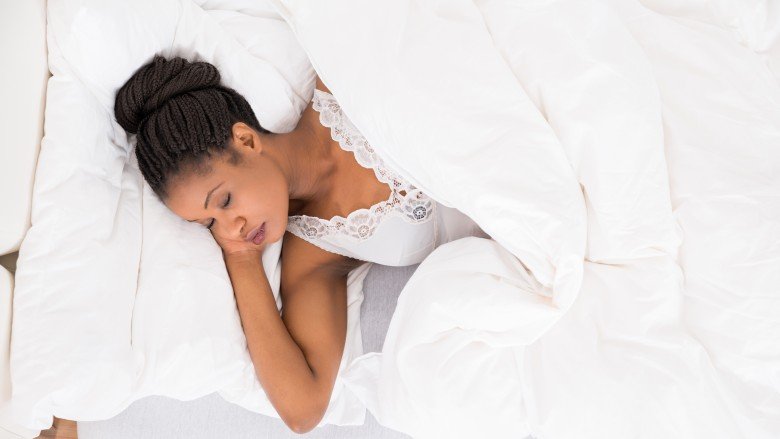Things You Should Never Ever Do Right Before Bed
Sleep is a crucial part of our overall health. It's during sleep that our bodies repair and build muscle after a workout, our brains consolidate the new information we've learned and store our memories, and our hormones, heart rate, and virtually all of our systems slow down and stabilize. When we don't get enough, or quality, sleep there are many repercussions above and beyond just being exhausted, like a weakened immune system as well as changes in metabolism and insulin resistance. You may think you know all the things you need to do before bed for a good night's sleep, but here are 12 things to avoid doing right before bed.
Watching TV
For many of us, the late evening after cooking dinner, cleaning up, and getting the kids to bed is the time we can finally catch up on our favorite TV shows. By this time of night you're already exhausted and may find yourself falling asleep in front of the TV. Then, when you crawl into bed, you're suddenly wide awake. What gives? Watching TV right before bed (or worse, having a TV on all night) can be quite disruptive to a good night's sleep. This happens for a couple of reasons. The first is that the blue light that is emitted by your TV affects the amount of the sleep regulating hormone melatonin that our bodies produce, making you less likely to be sleepy.
Not only are your hormones affected, but your mindset is as well. Your body and brain need time to wind down at the end of the day. If you're watching TV right up until the moment you want to fall asleep, you don't give yourself time to do that, especially your brain. You may still be thinking about what happened to that perp after Olivia Benson arrested him since this episode of Law and Order: SVU ended on a cliffhanger or who will be eliminated next week on Project Runway.
Using your phone or computer
Raise your hand if you sleep with your phone right beside you in the middle of the night and use it right up until the moment you go to sleep. Now, put your hand down and move your phone out of your bedroom. Using your phone or a computer right before bed is disruptive in many ways. Like watching TV, using your phone or computer for any reason right before bed gives your brain a lot to think about and digest. This isn't particularly conducive to falling asleep peacefully.
Just like televisions, smartphones and computers also emit melatonin disrupting blue light. Some of these devices now have a "blue light shade" that you can apply at night, similar to the effect of amber lenses researchers have used to demonstrate that blocking out blue light leads to significantly improved sleep. If this blue light shade technology isn't enabled on your device and you truly must use it right before bed, you may want to try decreasing the brightness of the display.
Reading a thriller
A great alternative to watching TV or staring at your phone right before bed is to read, but a lot of that depends on what you're reading. While reading a trashy romance novel, self-help book, or memoir might be a good way to wind down at the end of the day, it's going to be a lot harder to rest after reading a thriller in which the main character is running for her life or finds herself in a parallel world unlike our own. This is in part due to narrative empathy. While reading, we begin to associate and empathize with the lead characters, feeling what they feel. The emotions and physiological responses you have to a book you're reading can persist even after you've closed the book and are preparing for sleep.
Rather than helping you to relax, thrillers and similar kinds of books can increase your heart rate and brain activity, keeping you from having a restful night's sleep.
Checking work email
Some people like to check their work email right before bed to know what they'll be walking into the next day at work. Do you know what else it can do? Make you feel stressed about the day ahead. When you're stressed, it's harder to fall asleep and stay asleep. Trade checking work email late at night for checking it first thing in the morning before you head out the door. After all, there isn't much you can do the night before work that you can't do the next day. If you really must check work email at night, try to do so at least an hour before it's time for you to go to bed.
Arguing
You've probably heard the sage wisdom that you should never go to bed angry. In most cases, this advice is meant to reflect that you should resolve issues with friends, family, and significant others before going to sleep each night. In fact, having difficult conversations or arguing at night can not only do more harm than good in your relationship, it can negatively impact your sleep as well. People are generally optimistic about the time that will be required to resolve a dispute. This is in part because when we feel we are in the right or have a solution, we assume the other party will be quick to acquiesce (this is known as the false consensus effect).
Unfortunately, the other party may feel this way about his or her position as well, leaving you to argue your case for much longer than you anticipated. Not only can this lead to going to bed later, but there's no guarantee that you'll actually come to a solution before you go to sleep. Relationships are complicated and often the problems in them can't be solved with a single conversation. Now your heart rate is pounding, maybe you've also been crying, and your head is spinning with questions about what is going to happen to the relationship. None of that is conducive to a good night's sleep. Save those heavy conversations for the daylight hours when you'll have lots of time to get to a resolution.
Eating
Life can get busy, especially for those of us who work late hours or have children (or both). Before you know it, the clock says it's 9 p.m. and you still haven't eaten dinner. Unfortunately, eating right before bed isn't going to do you any favors. Not only has eating late at night been correlated with obesity, research suggests there is an overlap between eating late at night and binge eating disorder.
Even if weight gain isn't a concern for you, eating right before bed comes with other problems too. Foods that have hidden caffeine or sugar, like chocolate, can keep you awake even if you've avoided coffee. And in general, eating right before bed can lead to acid reflux during the night. If you must eat right before bed, stick to something small and simple to minimize sleep disruption.
Drinking caffeine
Speaking of the caffeine and sugar in chocolate keeping you awake, drinking caffeine should be avoided before bedtime as well. This doesn't apply just to coffee, as many teas contain caffeine that can keep you up at night. Even if you feel like you're able to fall asleep with no problem after drinking caffeine, you may still be affected. One study showed that not only can caffeine make it harder to fall asleep, it makes it difficult to "develop or sustain deeper stages of non-rapid eye movement sleep." This can lead to people feeling tired upon waking and reaching for the caffeine first thing in the morning as well. How late is too late to drink caffeine? One study found that drinking caffeine even six hours before bedtime reduced nightly sleep by more than an hour. The closer to bedtime caffeine was consumed in the study, the more disruptive it was to participants' sleep. Maybe skip that 4 p.m. coffee after all.
Drinking alcohol
Even if you aren't drinking to the point of passing out, a relatively small amount of alcohol can have an impact on your sleep, leaving you feeling tired and groggy the next day. Sure, a glass of wine before bed may make you feel more relaxed and help you fall asleep more quickly at the end of a long, stressful day — but the quality of your sleep will suffer. Drinking actually increases brain wave patterns that usually happen when you're awake, tricking your brain into behaving as if it's awake when you're actually trying to rest. This means that even if you're asleep, it isn't restful sleep because your brain is still quite active.
Smoking cigarettes
Like drinking, smoking cigarettes may help you feel more relaxed, but ultimately leads to sleep disturbances. This is in part because nicotine, the active drug in cigarettes, acts as both a stimulant and a sort of sedative. Immediately after exposure to nicotine, the drug stimulates the release of adrenaline, which increases blood pressure, heart rate and respiration. At the same time, however, nicotine acts on neurotransmitter receptors in the brain, leading to sensations of pleasure and relaxation that can feel sedating. This sense of euphoria and sedation is short-lived, and smokers are "significantly more likely than non-smokers to report problems going to sleep, problems staying asleep, daytime sleepiness, minor accidents, depression, and high daily caffeine intake," according to one study.
Drinking a lot of water
Hydration is important. Drinking enough water helps regulate blood pressure, flush bacteria from your bladder, and sustains virtually every system in your body. While many recommendations cite a need for six to eight glasses of water per day, minimum, right before bed isn't the time to realize you haven't drank water all day and try to throw back all six glasses. Not only is hydration throughout the day important, drinking water right before bed means you'll probably be getting up at least once during the night to head to the bathroom. It's difficult to get a good night's sleep when you're up and down throughout the night.
Taking a nice lonnnnng nap
While this probably isn't happening right before bed, napping earlier in the day can also impair your sleep in the evening. Unless it's a quick power nap, no more than 20 minutes, you may be groggy afterward.
Napping longer than 20 minutes in the afternoon has been shown to affect your stage 4 sleep during normal sleep hours as part of a study with the American Psychology Association. Power naps on the other hand, which are less than 20 minutes, have little to no effect on nighttime sleep quality. According to the National Sleep Foundation, power naps can actually make you more alert and aware.
Hitting the gym
The National Sleep Foundation recommends daily exercise to help you get better sleep, but keep in mind that going to the gym late at night can potentially have a negative effect on your sleep. Working out gets your adrenaline pumping and your heart rate goes up, which is definitely not a recipe for a successful night of sleep. This it isn't the same for everyone. A study in The Society of Psychophysiological Research suggests that people who work out late at night saw an improved sleep pattern.
So if you're working out late at night health experts suggest a quick cold shower to bring your body temp back down. Deep breathing can also help bring your adrenaline levels back down.
Sleeping until all hours of the day
This is another one that you aren't doing right before bed, but that can affect your sleep all the same. Pretend like your snooze button doesn't exist because setting an alarm every day for the same time will keep your circadian rhythm regulated as long as you actually wake up.
Your circadian rhythm is your body's internal clock and according to the National Sleep Foundation, the more you stay on its schedule the easier you'll fall asleep at night and wake up on time in the morning.
Turning up the thermostat
While you may think it's better to be cozy with the heat on to get a good night's sleep, it turns out that turning down the thermostat can actually lead to a better night's sleep. According to the National Sleep Foundation, the ideal temperature for sleep is between 60 and 67 degrees. According to one study, this is because "sleep preferably occurs during the circadian phase of decreased heat production and increased heat loss." When that rhythm is not allowed to happen naturally because you have the heat cranked up or you're covered in blankets and not allowing heat loss, your sleep rhythm can also be disrupted.
Changing your routine
Establishing a nighttime routine has been shown to be beneficial for all age groups ranging from young children to older adults. These routines work by signaling to your brain that sleep it's time to start winding down and preparing for sleep. While the most obvious way to establish a routine is to go to bed at the same time every day, bedtime routines often involve things like showering, brushing teeth, and other activities to begin the process of relaxing. Changing your routine can disrupt this signal to your brain that it's time for bed, making it harder for you to fall asleep.
One example is when you shower. If you normally shower in the morning to help wake you up, but decide to shower at night, your brain will see this as a signal to stay awake rather than sleep. Your best bet is to establish a routine that you can stick to every night to help put your body and brain on an internal clock for when it's time to go to bed.
Don't overthink it
Sleep is incredibly important, but it seems like there are all sorts of rules for what you have to do to get a good night's sleep. If it's giving up caffeine you're worried about, eating foods like meat, fish, milk, and eggs may help you with your midday energy slumps because they contain B12, which converts carbs into glucose, which is then used for energy production.
Realistically, it's unlikely that all of us can stick to all of these suggestions on a daily basis. Instead of stressing about whether or not you're setting yourself up for optimal sleep (remember, stress is no friend to sleep), just do your best. Take small steps to improve your sleep space as you can because any improvement in sleep is a good thing.
